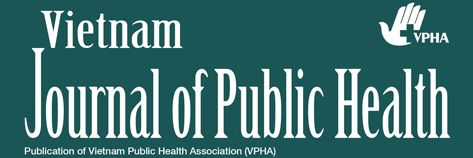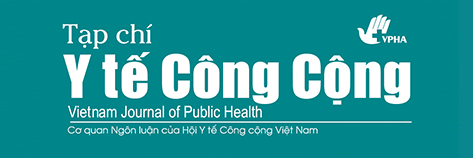Thay đổi kiến thức của người cha về nuôi con bằng sữa mẹ hoàn toàn trong 6 tháng đầu – Phát hiện từ chương trình can thiệp cộng đồng hướng tới người cha tại khu vực nông thôn Việt Nam (Changes in the fathers' knowledge on exclusive breastfeeding for the child's first six months in life -findings from a community intervention study in rural area of Viet Nam)
Tóm tắt
Giới thiệu: Vai trò của người cha trong mối liên quan tới dinh dưỡng và sự phát triển của trẻ nhỏ đã được nhìn nhận ở nhiều nơi trên thế giới. Tuy nhiên chỉ có một số ít nghiên cứu về hiểu biết và vai trò của người cha trong nuôi còn bằng sữa mẹ (NCBSM) hoàn toàn trong 6 tháng đầu. Nghiên cứu này kiểm định giả thuyết về sự cải thiện kiến thức cảu người cha sau chương trình can thiệp giao dục sức khỏe cộng đồng, sử dụng thiết kế nghiên cứu phỏng thực nghiệm, trước-sau, có đối chứng. Tại giai đoạn trước can thiệp, 251 cặp vợ chồng có vợ đang mang thai được chọn vào can thiệp (CHILILAB – Chí Linh) và 241 cặp tương ứng được chọn vào nhóm không can thiệp (Thanh Hà). Đối tượng can thiệp là những người cha có vợ đang mang thai. Hình thức can thiệp là các hoạt động truyền thông qua loa đài, tư vấn cá nhân và nhóm; các hoạt động vui chơi tại cộng đồng cùng với các sản phẩm truyên thông như pano, tờ rơi, cốc và áo phông có in hình ảnh và thông điệp của chương trình được gửi tới người cha. Sau can thiệp, kiến thức về NCBSM hoàn toàn trong 6 tháng của người cha ở địa bàn can thiệp được cải thiện một cách đáng kể so với người cha tại địa bàn không can thiệp. Kiến thức về khái niệm đúng, tầm quan trọng của NCBSM hoàn toàn và thời gian NCBSM hoàn toàn là 6 tháng của người cha ở địa bàn can thiệp cao hơn gấp 2,6 lần, 1,86 lần và 1,9 lần so với người cha ở địa bàn không can thiệp. Chương trình đã thành công trong cải thiện kiến thức của người cha về NCBSM hoàn toàn. Các hoạt động can thiệp cân tiếp tục duy trì và mở rộng tại Chí Linh và Hải Dương cũng như nghiên cứu việc triển khai can thiệp trên qui mô lớn hơn nữa để tăng cường kiến thức cảu người cha nhằm hỗ trợ NCBSM hoàn toàn.
English abstract
Significant associations between fatherhood-related factors and young child feeding have been recognized by studies worldwide. Yet, few studies have attempted to explore the fathers' knowledge and involvement in exclusive breastfeeding (EBF). This study tested a hypothesis of positive changes of the fathers' knowledge on exclusive breastfeeding after a health education program. A quasi-experimental, pretest-posttest, non-equivalent control group design was used. At the baseline, 251 pregnant women and their husbands enrolled in the intervention group (CHILILAB Chi Linh) and 241 comparable couples enrolled in the control group (Thanh Ha). The one-year intervention targeting fathers comprised radio programs, game show-style community events, short videos to trigger fathers' problem solving, posters, pamphlets, humorous coffee mugs, T-shirts, group and individual counseling. It is found that fathers in the intervention group had better knowledge on EBF than fathers in the control group. Such changes as correct understanding of EBF, importance of EBF in disease prevention, duration of 6 months for EBF found in percentages before and after survey of among fathers were respectively 2.6, 1.86 and 1.9 fold in the intervention group than those who were in the control group. The intervention was effective in significantly changing knowledge of fathers. The education model should be maintained and replicated in the local context of Chi Linh and Hai Duong and a larger-scale intervention should be conducted to support exclusive breastfeeding.
Từ khóa
Toàn văn:
PDF (English)##submission.citations##
Tài liệu tiếng Việt
Bộ Y tế (2006). Kế hoạch hành động nuôi dưỡng trẻ nhỏ 2006-2010. [Internet]. 15/3/2009. URL: http://www.viendinhduong.vn/doc/vi/3/DecumentReviewDetail.aspx
Đinh Thị Phương Hòa (2009). "Kiến thức, thực hành của bà mẹ về giữ ấm và cho trẻ bú sớm ngay sau khi đẻ". Y học Thực hành. 1: 111-113.
Trần Chí Liêm, Đinh Thị Phương Hòa (2009). "Đánh giá kiến thức cán bộ y tế và trang thiết bị tại các trạm y tế xã về chăm sóc trẻ sơ sinh". Y học thực hành. 5: 2-3.
Tài liệu tiếng Anh
Almroth S, Arts M, Quang N D, Hoa P T, Williams C (2008). Exclusive breastfeeding in Vietnam: an attainable goal. Acta Paediatr. 97(8): 1066-9
Bromberg B-YN, Darby L (1997). Fathers and breastfeeding: a review of the literature. Journal of Human Lactation. 13: 45-50
Dearden KA, Quan le N, Do M et al (2002). Work outside the home is the primary barrier to exclusive breastfeeding in rural Viet Nam: insights from mothers who exclusively breastfed and worked. Food Nutr Bull. 23(4 Suppl):101-8
Duong D V, Binns C, Lee A H (2005). Introduction of complementary food to infants within the first six months postpartum in rural Vietnam. Acta Paediatr. 94 (12): 1714- 1720
Duong D V, Binns C W, Lee A H (2004). Breast-feeding initiation and exclusive breast-feeding in rural Vietnam. Public Health Nutr. 7(6): 795-9
Duong D V, Lee, A H, Binns C W (2005). Determinants of breast-feeding within the first 6 months post-partum in rural Vietnam. J Paediatr Child Health. 41(7): 338-43
Fjeld E, Siziya S, Katepa-Bwalya M, et al (2008). No sister, the breast alone is not enough for my baby' a qualitative assessment of potentials and barriers in the
promotion of exclusive breastfeeding in southern Zambia. International Breastfeeding Journal. 3(1): 26.
Forster D, McLachlan H, Lumley J (2006). Factors associated with breastfeeding at six months postpartum in a group of Australian women. International Breastfeeding Journal. 1: 18
Glover M, Waldon J, Manaena-Biddle H, Holdaway M, Cunningham C (2009). Barriers to best outcomes in breastfeeding for Maori: mothers' perceptions, whanau
perceptions, and services. J Hum Lact. 25(3): 307-16
Ingram J, Johnson D (2004). A feasibility study of an intervention to enhance family support for breast feeding in a deprived area in Bristol, UK. Midwifery. 20(4): 367-79
Le D.T, Nguyen H.T, Tran TD, Nguyen H P, Nemat H (2010). Nutrition Surveillance 2010. VietNam Nutrition profile 2010. Published by Alive & Thrive, NIN and UNICEF.
López-Alarcón M, Villalpando S, Fajardo A (1997). Breast-feeding lowers the frequency and duration of acute respiratory infection and diarrhea in infants under six months of age. J Nutr. 127(3):436-43.
McIntyre E, Hiller J E, Turnbull D (1999). Determinants of infant feeding practices in a low socio-economic area: identifying environmental barriers to breastfeeding. Aust N Z J Public Health. 23(2): 207-9
Rempel L A, Rempel J K (2011). The Breastfeeding Team: The Role of Involved Fathers in the Breastfeeding Family. J Hum Lact. 27: 2 115-121
Tohotoa J, Maycock B, Hauck Y, et al (2009). Dads make a difference: an exploratory study of paternal support for breastfeeding in Perth, Western Australia. International breastfeeding journal. 4:15
Tran Huu Bich (2009). Father's Involvement and Child Development. Evidence from a Rural area of Viet Nam. LAP Publication. 96-100



